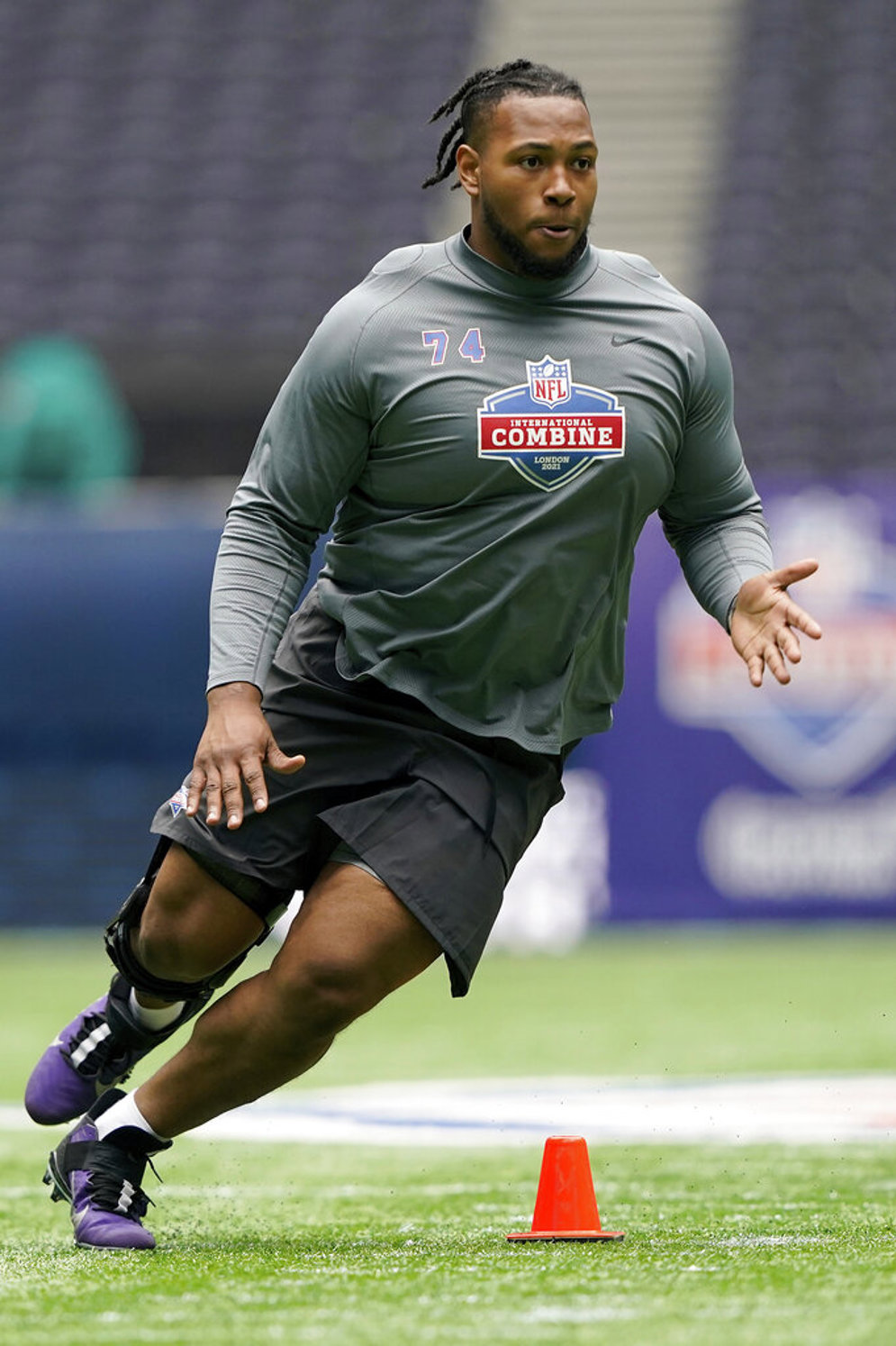Danielle Hunter (DE, Jamaica): Hunter moved to the U.S. from Jamaica when he was eight years old where he picked up football in the Houston suburbs. The two-time Pro Bowler was selected by the Minnesota Vikings in the third round of the 2015 NFL Draft and currently plays for the Houston Texans. (AP/Steve Luciano)
Football is an increasingly global sport, with more and more international players making the jump to the United States’ most popular game. The International Player Pathway Program makes it easier for clubs to identify promising global talent.
International players have been a part of the NFL since its first season in 1920.
That year, the American Professional Football Association — renamed the National Football League in 1922 — featured several prominent players born overseas. The list included German-born John and Phil Nesser, the eldest of seven Nesser brothers to play in the NFL. It also included Irishman Bob Nash, the first player credited with a fumble recovery touchdown, the first player to be traded and the first captain of the New York Giants.
Nine players who were born outside the U.S. have been inducted into the Pro Football Hall of Fame:
|
Player |
Birthplace |
Position |
Team(s) |
Inducted into HOF |
|
Bronko Nagurski |
Canada |
Fullback |
Chicago Bears (1930–37, 1943) |
1963 |
|
Steve Van Buren |
Honduras |
Halfback |
Philadelphia Eagles (1944–51) |
1965 |
|
Leo Nomellini |
Italy |
Defensive tackle |
San Francisco 49ers (1950–63) |
1969 |
|
Ernie Stautner |
Germany |
Defensive tackle |
Pittsburgh Steelers (1950–63) |
1969 |
|
Tom Fears |
Mexico |
Defensive end |
Los Angeles Rams (1948–56) |
1970 |
|
Arnie Weinmeister |
Canada |
Defensive tackle |
New York Giants (1950–53) |
1984 |
|
Ted Hendricks |
Guatemala |
Linebacker |
Baltimore Colts (1969–73) |
1990 |
|
Jan Stenerud |
Norway |
Placekicker |
Kansas City Chiefs (1967–79) |
1991 |
|
Morten Andersen |
Denmark |
Placekicker |
New Orleans Saints (1982–94) |
2017 |
37 international players have signed with NFL teams since the start of the program. NFL rosters feature players hailing from more than 25 foreign countries, including players from Canada, Australia, Nigeria, Germany, Jamaica, Austria, England, Scotland, Mexico, and Tonga.
International Player Pathway Program
The International Player Pathway Program helps foreign-born football players reach the NFL.
Since its inception in 2017, the program has provided elite international athletes with an opportunity to compete at the NFL level, improve their skills, and potentially earn a spot on an NFL roster.
“The International Player Pathway Program provides athletes with a viable route to the NFL and an opportunity to further develop their skills,” said Damani Leech, Chief Operating Officer of NFL International.
Meet the 2024 IPP Program Participants
The NFL has specific roster rules for players that sign through the IPP. Each season, an NFL division is selected at random to participate in the IPP program. Designated teams are allowed an extra offseason roster spot for the IPP player that is assigned to that team.
At the end of training camp, IPP players can either be signed to their assigned club’s 53-man roster or waived. Players who clear waivers may be signed to their assigned team’s practice squad using an IPP exemption that allows for an extra practice squad spot. IPP players signed to a practice squad using the exemption may not be signed to any team’s active roster that season; however, players signed to a practice squad without the exemption are treated in the same way as other practice squad players for roster purposes.
As of 2023, more than half of NFL teams have signed international players to their offseason/practice squad rosters as a direct result of the IPP program, with several players making active rosters. Since the IPP was instituted in 2017, more than 50 players from 18 countries have trained in the U.S. through the IPP program.
Three players whose careers started in the IPP program — Efe Obada, Jordan Mailata, and Jakob Johnson— have recorded over 1,000 career NFL snaps.
The NFL International Combine

(AP/Steve Luciano)
The NFL’s International Combine allows clubs to identify candidates for the IPP program. The invitational scouting showcase, mirrored after the annual NFL Scouting Combine in Indianapolis, is designed to discover and evaluate potential NFL talent from around the globe for a potential spot in the IPP.
The NFL has hosted combines in Australia (2018), Germany (2019) and London (2021 & 2022).
Players who meet specific performance standards and display the potential to play in the NFL will be invited to train in the U.S. for three months as part of the IPP program. The number of participants will be reduced following training camp and a select number will be allocated to designated NFL clubs for the upcoming season.
The International Combine is also a testing ground for new drills that can be used to evaluate player performance. The 2021 International Combine featured several new drills that may more effectively align with player movement on the field. The "hoop drill" that debuted at the 2019 International Combine is now used to evaluate defensive linemen at the NFL Scouting Combine.



